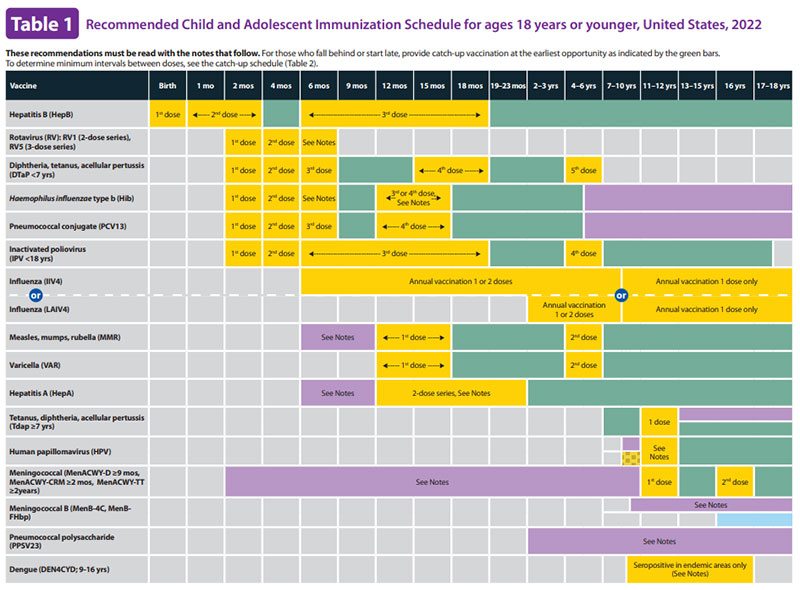CDC Immunization Schedule – The United States has been divided on the topic of vaccinations since the first launch of the vaccine for COVID-19. A huge number of people do not believe that vaccines are working, while most people have already got their vaccine along with the booster shots.
The debate on the COVID vaccine is not over yet and now people have started talking about the vaccine for the monkeypox virus. There are several problems with vaccines for these viruses, but it doesn’t mean that the world revolves around both of them.
The Centers for Disease Control and Prevention have a huge CDC immunization schedule which is recommended for every person in the United States. Apart from coronavirus and monkeypox virus, several diseases and viruses can infect a person and they are much more deadly and have severe consequences.
For example, polio can make you disabled for life. That is why today, we are here to discuss everything regarding the latest CDC immunization schedule.
Hepatitis B
The vaccine for hepatitis B is the first and only vaccine that is administered at the time of birth. Usually, your doctor will suggest you get your child the vaccine for hepatitis B as early as possible after birth.
Once your child has completed the first month, it is time for the second shot of the hepatitis B vaccine. The Centers for Disease Control and Prevention recommend the second dose of hepatitis B during the first and second months after birth.
The third dose of the hepatitis B vaccine can be administered in the 6th month to the 18th month. It is a 3 dose vaccine that is recommended for every child in the United States.
Rotavirus
Along with hepatitis B, the Centers for Disease Control and Prevention also recommended a vaccine for rotavirus in its latest CDC immunization schedule.
The first dose of the rotavirus vaccine should be administered in the second month, while the second dose of the vaccine can be administered in the 4th month.
It is a two-dose vaccine, but depending on the condition of the patient, your doctor might suggest you get three or more doses.
Diphtheria, Tetanus, & Acellular pertussis
The latest CDC immunization schedule also recommends vaccines for Diphtheria, Tetanus, & Acellular pertussis.
As per the latest schedule, every child in the United States should get the first dose of the vaccine in the second month. The second dose can be administered after the 4th month of birth.
The third dose of the vaccine can be administered after the 6th month, and the 4th dose can be administered between the 5th to 18th months.
Vaccine for Diphtheria, Tetanus, & Acellular pertussis is a five-dose vaccine, and the last dose can be administered between the 4th to 6th year after the birth. For more information regarding the vaccine, you should consult with your healthcare provider or public healthcare officials.
Haemophilus influenza type B
The next recommended vaccine in the CDC immunization schedule is the vaccine for Haemophilus influenza type b.
Similar to other vaccines, it is also a multi-dose vaccine, and the first shot should be given in the second month after the birth. The second shot can be administered in the 4th month after the birth.
Depending on the condition of the patient, your healthcare expert mildly suggests you go for the 3rd and 4th doses. The Centers for Disease Control and Prevention have recommended additional doses for immunocompromised patients and patients with other medical conditions.

Pneumococcal Conjugate
The next recommended vaccine in the CDC immunization schedule is Pneumococcal Conjugate. Similar to the vaccine for tetanus, it is also a four-dose vaccine that starts in the second month and ends in the 15th month after birth.
The Centers for Disease Control and Prevention recommend the first dose of the vaccine after the second month and the second dose of the vaccine after completing the 4th month.
The third dose of the vaccine can be administered after the 6th month of birth. The last dose of the vaccine can be given between the 12th to 15th months after the birth. For more information, you can consult with your healthcare provider.
Inactivated poliovirus
Even though the United States does not record any cases of poliovirus in the country, the Centers for Disease Control and prevention have included the vaccine for inactivated poliovirus in its latest CDC immunization schedule.
The first dose of the vaccine can be delivered after the second month of birth. The second dose of the vaccine can be delivered after the 4th dose of birth.
The third dose can be administered between the 6th month all the 18th month after the birth.
4th and last vaccine, inactivated poliovirus, can be administered between the 4th to 6th year after birth. There is a catch-up range for recommended vaccines by the Centers for Disease Control and prevention. If anyone missed any dose, then your health expert might be able to give it in the recommended catch-up Time.
Influenza
Once your child has completed the first six months then your child will be eligible to receive one or two doses of the annual influenza vaccine.
You might have seen vaccination drives near your neighborhood for the flu vaccine. It is the same vaccine and starting from the first year, it is recommended till death. You and your child are supposed to get at least one dose of the influenza vaccine every year.
There are two or three different types of influenza vaccines available in the market, which are recommended by the Centers for Disease control and prevention in its latest CDC immunization.
You can consult with your healthcare provider.
Measles, mumps, and rubella
The next recommended vaccine in the CDC immunization schedule is measles, mumps, and rubella. It is a multi-shot vaccine that is going to start after the 4th year of birth.
The first short can be given between the 12th to 15th month from birth. The second shot of the vaccine can be administered between the 4th and 6th year of birth.
If your kid is at high risk, then the Centers for Disease Control and Prevention recommend it as early as six months. Depending on the date of birth or the condition of the patient, the Centers for Disease Control and Prevention recommend one or two doses but to gain 19th year to all the ways 65th year.
Hepatitis A
The Centers for Disease Control and Prevention also recommends vaccines for hepatitis A. the age to get both doses is between 12 months to 24 months from birth.
You must maintain at least a six months gap between both of the shorts. For more information, you can consult with your healthcare provider.
The CDC immunization schedule was bold, so it included a catchup vaccination program for the hepatitis A vaccine. If your kid misses any vaccine for hepatitis, they might be eligible to get it later.
Dengue
Even though the United States does not require many cases of dengue these days, there is a recommended vaccine for dengue as well.
There is a 3-dose vaccine for dengue which can be administered between the 9th to 6th year after birth. The vaccine is only recommended for kids who are vulnerable and immune-compromised.
For more information regarding the vaccine, you can consult with your healthcare provider.
COVID 19
Since the first spread of COVID-19 in the United States, the Centers for Disease Control and Prevention have launched an interim immunization schedule for COVID-19. Vaccines for COVID-19 include doses between two to four, depending on your age and health condition.
- Everyone above the age of six months is eligible to receive two short primary series of COVID vaccines.
- You must maintain at least an eight weeks gap between the first and second shots of the primary series.
- Everyone above the age of 5 is also eligible for at least one booster shot.
- There must be a five-month gap between the final dose of the primary vaccine series and the first booster shot.
- Everyone above the age of 50 is also eligible for a second booster shot of the COVID vaccine.
- As per the CDC immunization schedule, everyone must maintain at least a four months gap between the first and second shots of the COVID-19 vaccine.
- Everyone above the age of 12 who is immunocompromised is also eligible for a second booster shot for COVID-19.
Are vaccines included in the CDC immunization schedule completely free?
No, not every vaccine included in the CDC immunization schedule is completely free in the United States. The federal government of the United States has launched several programs with the help of state governments to provide free vaccines. You can consult it with your healthcare provider or visit a nearby public healthcare center For more information on free vaccines.
